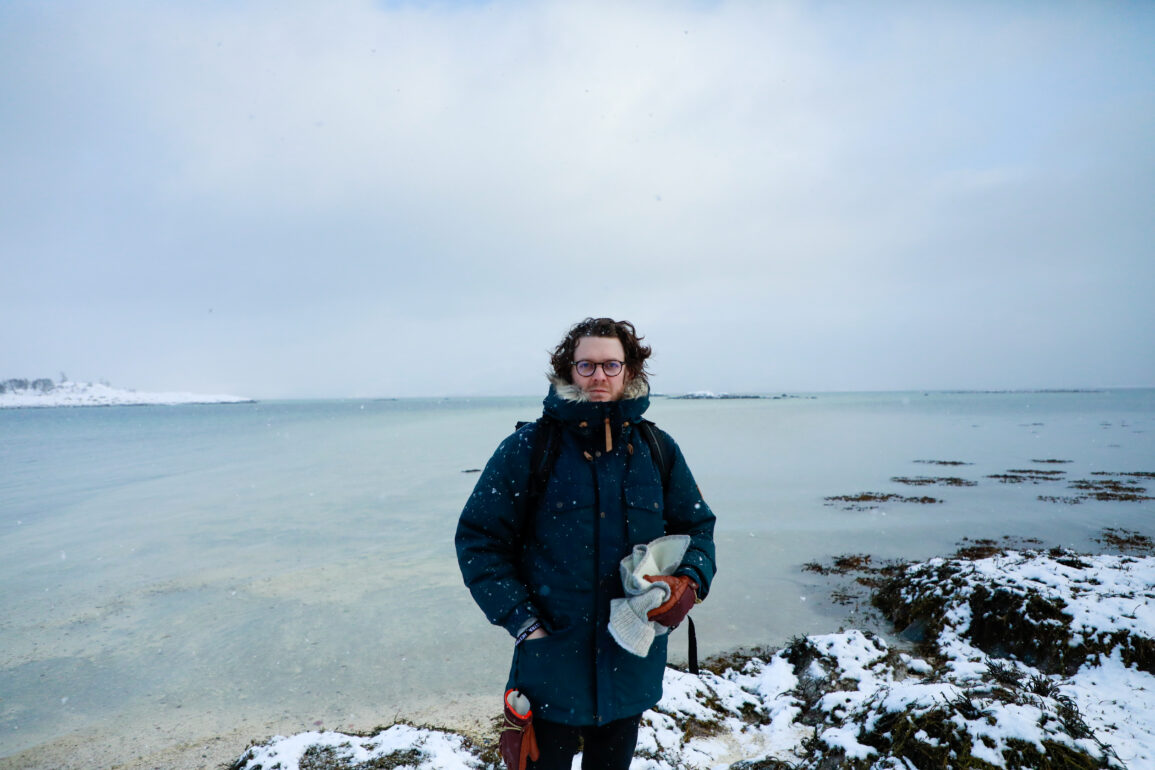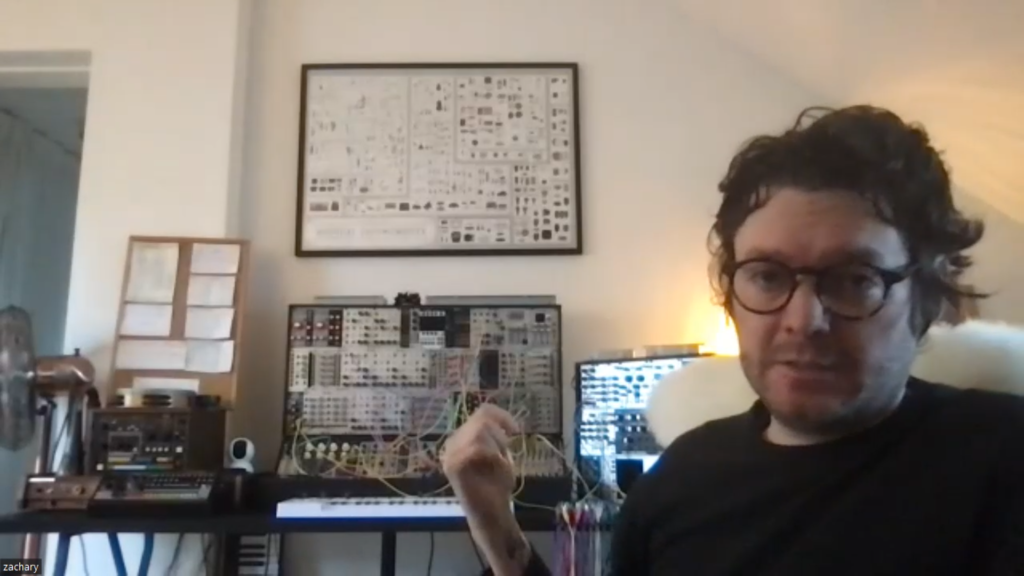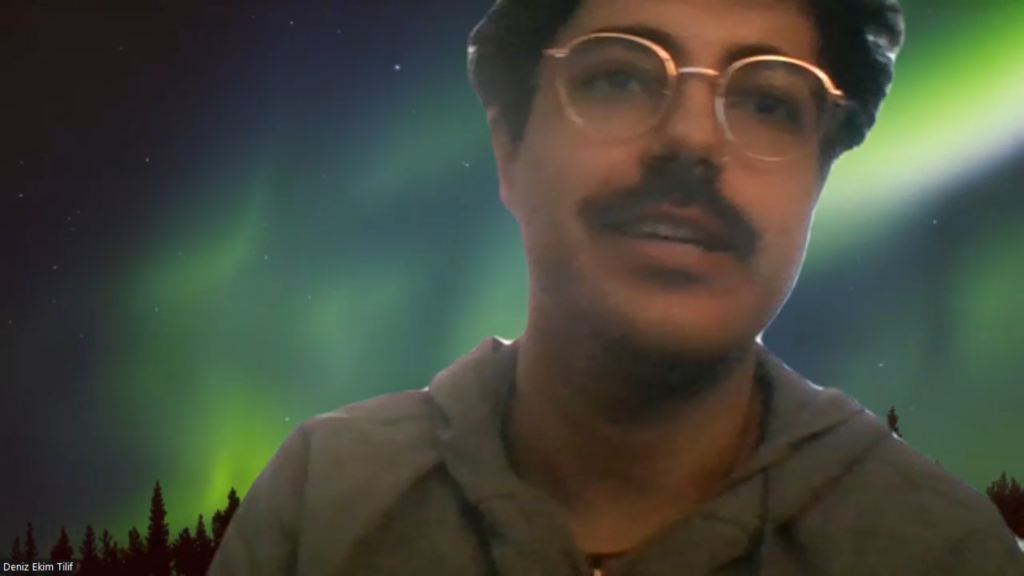Zach Condon, the man of travels and many instruments, has returned with Hadsel, the first new Beirut studio album in four years. Coming after a period of isolation and healing in Norway, the record is -as usual- a highly impressionistic and mesmerizing Beirut album. We talked to Condon to hear more about it.
Hi, Zach. How are you?
I’m okay. How are you?
Better now that I see you. That’s a cool synthesizer behind you.
That’s what I did a lot of the percussion on. I did not get it for that originally, I had this whole idea of making a polyphonic synthesizer from scratch, where I could control every voice individually. Your background is nice. It reminds me of Norway.
It’s hard to keep track of you. Where are you now? In Berlin?
Yeah, I am. I have been staying in Norway a lot too. I spent most of this year back up there, but right now I’m in Berlin. I am kind of in the middle of debating whether I will move there or not in the next few years. Still thinking about it.
Hadsel really effected you, huh?
Yeah, big time. I didn’t expect to meet so many people, but I ended up making some good connections up there. I feel strongly connected to the place at this point.
I know healing is not a linear thing, but your stay in Hadsel has helped you recover a lot, and the album’s story is strongly related to that experience. Can you go over that story once again for our readers?
Sure. Back in 2019, I was on the road. I had promised my band and all of my fans that I was going to do this world tour. I had already done the US part. But I just kept getting really sick. I was getting these throat infections that just would not go away. I was taking a lot of antibiotics and steroids to try and get through the tour and, eventually, a doctor told me, “If you keep doing this, you are gonna damage your voice permanently.” I had done something like that before, actually, about ten years ago. So I always had this awful relationship with the road, unfortunately. Sure, it was physical because I was getting sick. But I also realized it was mental because my entire relationship with the touring was defined by these mental breakdowns. So I really needed a place to run away to, and that’s how I ended up choosing Hadsel.
I have a strong connection with the idea of winter being a time for recovery, rest, introspection, and consideration. In Berlin, the winter isn’t very wintery anymore. It’s rainy and gray like it is today. It used to snow every year, but it doesn’t anymore, and I miss the snow. A lot of people think that because I am from New Mexico, I come from the deep desert. But I am actually from the mountains. That’s what I missed, and I wanted some extreme version of that.
You preferring cold weather was pretty much me when I was a little bit younger. Nowadays, while I’m still not exactly a summer person, I prefer spring and autumn over winter. Do you still prefer the cold after staying in Norway, one of the coldest countries in the world?
Absolutely. It was a relief for me. The older I get, the less I can stand the heat. I never liked it anyway, but now I can’t even tolerate it. So for me, it was great to spend the summer in a place where it rarely gets above twenty degrees celcius. It was all like a great vacation to get away from all that. Heat, to me, feels claustrophobic. It was actually one of the hardest things about Istanbul when I spent the summers there. I used to go down to the Marmara Sea and swim during the day. The heat was really torturing me.
I read in another interview something like you hoping for listeners to envision landscapes through your songs. So put things into a better perspective, tell me more about Norway and Hadsel by referring to the locations you named your songs after. What kind of locations are Stokmarknes, Spillhaugen, and the long-named studio on the tenth track I won’t even attempt to pronounce because I know I’ll butcher the word?
I think you did really well with those two pronunciations, though. For me, the landscape-envisioning part you mentioned is more of an impressionistic thing. It’s not like I’m telling people to think of a specific thing. It’s more like “When I think of the song, I think of this.” It’s never meant to be something more than a suggestion. The album feels a bit wintery to me, but that could be wrong. People can enjoy it in whatever way they like. But I really feel the songs belonged to that place because of the writing process. Even during the songs I wrote here in Berlin when I came back to finish the album, I still felt like I was dreaming and thinking of that place, like they belonged there. But I’m very unintentional with writing, actually. It’s not like I sit down and say “This song is gonna sound like this,” or “I want this part to sound like a scenery.” That’s not how music works, it’s all instinctual. You put something down and you react to it, and then you react to that over and over. It’s only afterward that you can see, “Oh, maybe…”
Most of the album was written with two instruments: The pump organ and the modular synth/drum machine. I have started to think of the latter as the ‘outside’ elements, the intense weather beating the cabin, feeling very dangerous and rough. And the organ drone felt more like a warm blanket, or the fireplace in the cabin. Besides that, songs like “Melbu” and “Island Life” were written as a consequence of my thoughts rolling through the town. All the lyrics were very improvised, so it’s not like I had some serious thought that I needed to get across. Those just randomly came to me. That’s a whole story on its own, but the short version is I have always struggled with lyrics. I don’t often like lyrics, actually. They bother me because it feels like they are taking away this mystical thing. It’s like the Northern Lights or something. You can explain what it’s like, but it’s a magical experience beyond definition. Lyrics, though, are explanatory: “Hey, it’s actually a scientific thing, etc.” Totally removes the magic. It can help, sure. I like lyrics sometimes, but people often pay too much attention to them. With this album, I decided to not pay attention myself and, in doing so, I started to improvise and get whatever would come across as “Oh, so that’s what I was thinking? Interesting. I didn’t know that.”
Regarding language, a friend of mine once said this to me: “The words often spoil the purity of the thoughts.”
Right. I always felt like music was bigger than language. It’s deeper than language in some way. I’m an obsessive linguist. Obviously not in a professional way, but I love trying to learn new languages and figure out where the roots of the words come from, what they mean culturally, how they change perceptions, and stuff like that. But for some reason, I always seem to think the music and language are somehow separate. I am getting to a point where I can appreciate good lyrics in a good song that actually benefit each other. I am still in the mindset where I think music is the deeper and more magical thing, though. Language is descriptive while music is emotive and instinctive.
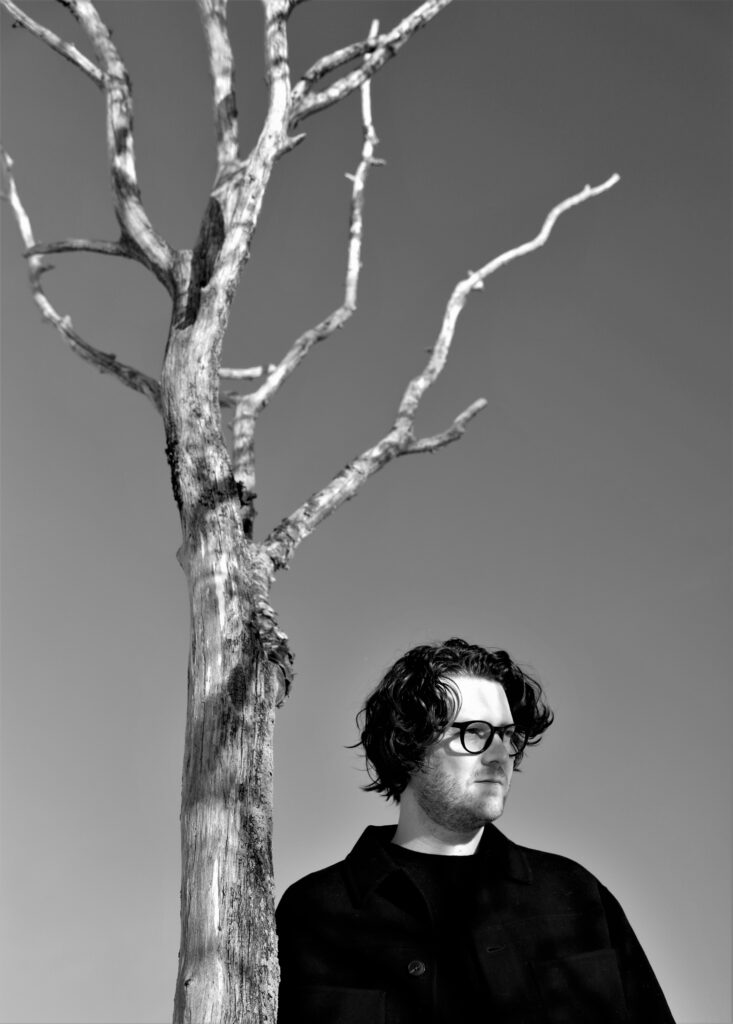
Considering the mental state you were in while making the record, if you were to handpick the easiest and hardest song to shape from this record, what would they be?
The easiest was the last one, “Regulatory”. It came the quickest and was also the last one I wrote. I must have written the whole thing in 20 minutes, or something like that. I once again improvised the lyrics, which I found really interesting. They are not even grammatically correct, they are very sloppy and weird. (laughs) I was forming the thoughts as I was singing them, so what you are hearing was literally the first thing I sang on it. I tried to go back and clean it up later, but I felt that would just remove whatever spark and excitement was there. It was all natural. It just came to me, there it was. That melody is really important to me, it feels like peace and finality.
As for the hardest… There were a few songs that I really wrestled with, but “Stokmarknes” was especially challenging. Right in the middle of the album. I did it almost entirely on this modular synth behind me, and it was really wild. These instruments are always sort of out of control. It’s really hard to get all the sounds to join together. I got this so I could control every individual voice within a chord. I can trigger one chord with a little MIDI keyboard controller I have. But every voice is going in its own direction, and you are trying to get them to stay together. It just became this huge mess. For a large amount of time, I thought that song wasn’t going to make the record, just because it was so sonically out of control. Also, I didn’t really know where to take it. Once it starts, it just goes. I wasn’t really sure how to convey its atmosphere. I think that one got the feeling of catatonic depression right. That really hit me, that utter helplessness, defeatedness, and rhythmic obsessiveness. I think that song really nails the inner space. But it was really rough to mix. It took me months, maybe even a year to get it right.
So one song took twenty minutes, and the other a year. Considering your works before Hadsel, do the time periods you create your songs in usually differ that much?
Sometimes. Some songs can come quickly and are dealt with quickly. They are much clearer, and more obvious in what they are trying to say. Other songs, like “Stokmarknes”, have the initial idea of being a super spontaneous thing, but it takes months and months to shape them, to put them under a context that makes sense. I still have some songs I never finished sitting around from different albums, because they were just too messy, or had a great idea initially but just died out because I don’t know where to build them to.
So far, you only mentioned two instruments you used in your music, but I know you have many other exciting stuff. Name one really exotic, little-known instrument in your collection.
Sure. Let me show you. As you can see, I have a lot of stuff here in my studio. I have some stuff that doesn’t work, unfortunately. Here, you see probably the weirdest one that’s currently working: It’s a pipe organ that is played by foot power. You fill it with air down there, and it plays these pipes. I have been able to use it for some of the new stuff I’ve been working on. This one was hand-built for me in Budapest. Believe it or not, normally these things are played more like an accordion, where they have a bellow on the back which you pump by hand in order to play the keys and the pipes. So I asked the manufacturers to instead build foot pedals to pump air into it. They said, “Yeah, that is possible!” And they did it. As a result, you get this very expressive instrument. When you overfill the bellow, it makes a blasting sound. It’s all very interesting.
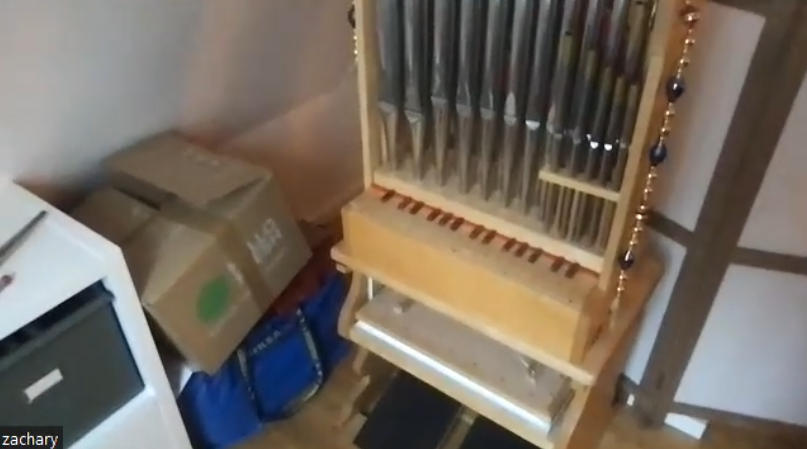
This next one is a fan question: Can you name a very special memory you would like to share from your times in Istanbul?
Actually, what I was talking about earlier is one of my fondest memories. When it was super hot, I would go down to the Marmara Sea and it was all these people taking time off work. It was too hot to do anything else. That was a great time for me to do small talk, and to try and chat with people. It was a really nice experience.
Another memory I have is my wanderings there at night. Because that was when all the cats would come out. And people would be feeding them while being absolutely surrounded by cats. (laughs) I remember once this gang of dogs came, and I felt really protective of cats, so I was trying to scare them away. They went away, I thought they would keep coming back because they came the next day as well. Now I was afraid the dogs would try to take over the territory, but eventually, it went to the cats again. Not that I don’t like dogs. At that time, I was just like, “No! This place belongs to cats!”
When you think of a few healing moments Beirut has brought you, what immediately comes to mind?
Probably The Flying Club Cup and this album. They are the most in-recovery type of records. The former happened after my first record got picked up by two record labels, one in the US and one in the UK. I did this huge US tour, and by the time I got to Europe, I started having breakdowns. I was experiencing these panic attacks which I didn’t believe in at the time, I thought they were heart attacks. It got so bad that I canceled that tour, and by the time I got home in New Mexico, I was having this horrible depersonalization dissociation, where you don’t know who you are or where you are. That got quite psychedelic. I would literally wake up and not know what existence was. It was like my brain being pulled from death every morning because I would just be blank. Nothingness. I would suddenly stare at my hands and not know what hands were, I would not know what breathing was. It was this horrible, horrible period where everything felt like I was dying or disappearing from existence all the time. Very intense. So I started writing music, ironically, because that was all I could think to do. I still had all my equipment left in my childhood bedroom in Santa Fe. I was writing The Flying Club Cup in order to feel I still belonged to reality. It was the closest thing I had to meditation and healing.
I am getting to a point where I can appreciate good lyrics in a good song that actually benefit each other. I am still in the mindset where I think music is the deeper and more magical thing, though. Language is descriptive while music is emotive and instinctive.
Zach Condon
Does it feel that despite your ever-adventurous, constantly-traveling spirit, you found a sort of safe place in your musical language? In the sense that, yeah, of course, you experiment with your music making, but you also designed this Beirut sound, instantly recognizable and unique to you, that feels like a warm blanket for listeners.
That’s true. I agree with you in a lot of ways. I always felt very “homeless” my entire life. This is potentially gonna sound cliché, but the music I create is a kind of way to feel a part of things. It’s a way to understand everything, and also to feel connected somehow. People always say to me, “Oh, you have lived in all of these places where you don’t speak the language.” In Turkey, I learned enough to order food and be polite. I spoke enough, I understood a little. But most of the time, I spent time in places where I didn’t fully learn the language or fully become part of anything. Yeah, but I felt like that since I was a kid! In many ways, that’s not so different than how I’ve always been. Always watching, never directly part of something. That’s not wonderful or ideal, but it’s interesting. For me, music is the imaginary world where I live and how I make sense of things. I think that’s what many people hear too. And yeah, that’s some sort of comfort, the warm-blanket-type thing.
If Beirut had a memorial stone in a Musicians Theme Park 100 years from now, which one of your lyrics would be written on it?
It would be something incomprehensible. (both laugh)
You can check out Beirut’s official website here.

